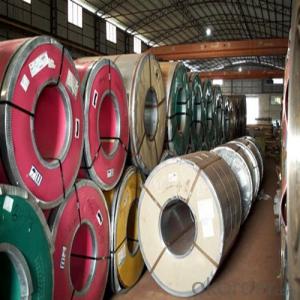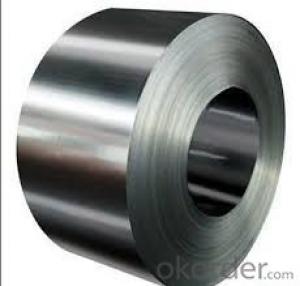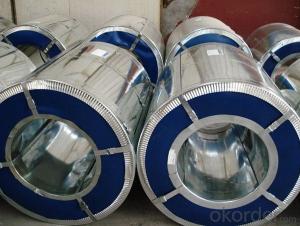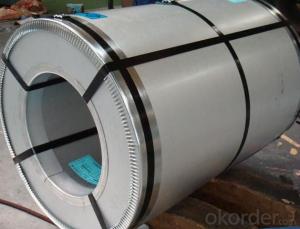Stainless Steel Coil in Hot Rolled Cold Rolled
- Loading Port:
- Guangzhou
- Payment Terms:
- TT OR LC
- Min Order Qty:
- 100 m.t.
- Supply Capability:
- 5000 m.t./month
OKorder Service Pledge
OKorder Financial Service
You Might Also Like
1.Structure of Hot Rolled Stainless Steel Coil:
Stainless steel coil is a production which not easy rust, acid resistance and corrosion resistance, Stainless steel coil is a new kind of Austenite stainless steel by used Mn, N replace Ni. so it is widely used in light industry, heavy industry, daily necessities and the decoration industry. Stainless steel coil has good corrosion resistance and hot / cold processing performance, instead of stainless steel products for used in the not high of corrosive environment, such as indoor, inland city outdoor etc.
2.Main Features of the Hot Rolled Stainless steel coil:
1) High Quality: Using Latest automated control equipment to ensure the quality
2) Best Price: With most automated equipments to ensure our price is lower than the market
3) Fast Delivery: The delivery date within 20 das after get your order
4) Best Service: Our after-sell service team will help you to slove all the problems about the order
3. 304 Stainless steel coil Images
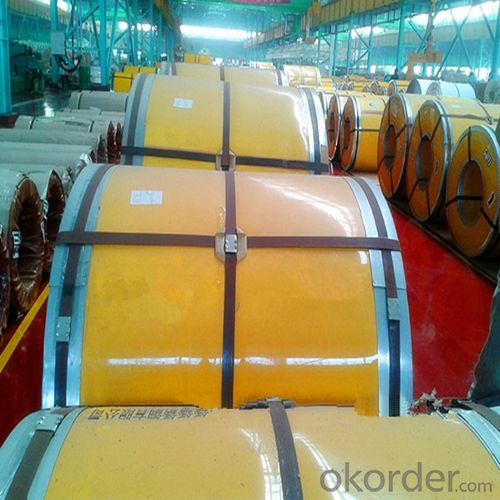
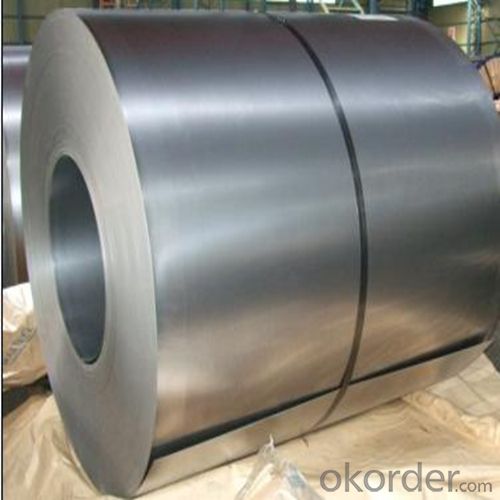
4. 304 Hot Rolled Stainless steel coil Specification
Product name: 304 Stainless Steel Coil
Thickness: 0.2mm to 1.5mm
Technical: Cold Rolled
Width: 10mm to 1240mm
Type: 200 Series
Length: As customer's requested
Standard: JIS, SUS
Finish: BA, 2B, 8K, NO.3, NO.4, HL
MOQ: 100 MT
Ship Term: FOB Shenzhen port or CNF import port
Delivery Time: 15 to 20 day after the receive the deposit or LC
Packaging: By wooden pallet, wooden case or according to customer's request
5.FAQ
We have organized several common questions for our clients,may help you sincerely:
1) How about your company?
2) A world class manufacturer & supplier of castings forging in carbon steel and alloy steel,is one of the large-scale professional investment casting production bases in China,consisting of both casting foundry forging and machining factory. Annually more than 8000 tons Precision casting and forging parts are exported to markets in Europe,America and Japan. OEM casting and forging service available according to customer’s requirements.
3) How to guarantee the quality of the products?
4) We have established the international advanced quality management system,every link from raw material to final product we have strict quality test;We resolutely put an end to unqualified products flowing into the market. At the same time, we will provide necessary follow-up service assurance.
5) How long can we receive the product after purchase?
6) In the purchase of product within three working days, We will arrange the factory delivery as soon as possible. The pecific time of receiving is related to the state and position of customers.Commonly 7 to 10 working days can be served.
- Q:What is steel made of and what is its molecular weight? It's for a project in chemistry class so if you have a website link as well, that would be great!
- Steel is an alloy consisting mostly of iron with a little Carbon thrown in. Steel is not a molecule, therefore, it does not have a molecular weight. Steel contains atoms of iron and carbon in a crystal lattice, along with various other alloying elements such as manganese, chromium, vanadium, and tungsten.
- Q:What is the maximum thickness of steel coils?
- The specific application and manufacturing process play a significant role in the potential range of maximum thickness for steel coils. Typically, steel coils may vary from a few millimeters to several centimeters in their maximum thickness. Determining factors include the intended use of the coils, the type of steel employed, and the capabilities of the manufacturing equipment.
- Q:How are steel coils used in the manufacturing of pressure vessels?
- Steel coils are used in the manufacturing of pressure vessels as they provide a strong and durable material for constructing the vessel's shell. The coils are typically rolled and welded to form the cylindrical shape of the pressure vessel, ensuring high structural integrity and the ability to withstand high pressure.
- Q:does anyone out there know where to get a good deal on a pedal steel guitar? i am from northern indiana and i'm willing to travel some if i have to.i am just getting into pedal steel guitar and i really don't have any idea what i need. i don't know how to play a guitar (i do know how to play the piano and the drums) at all but i want to learn to play the pedal stell guitar and i can't do that without getting one first so, if anyone can help me out i would greatly appreciate it! :o)
- I agree with everything that Lester said. Another thought is to consider starting on a lap steel guitar rather than a pedal steel - its related, a little easier to learn on, and less expensive. Once you get proficient on the lap steel, you can move up to the pedal steel. Good luck!
- Q:How are steel coils recycled?
- Steel coils can be recycled through a process that involves melting them down in a furnace, removing impurities, and then shaping the molten steel into new coils or other steel products. This recycling method helps conserve resources, reduce waste, and significantly cut down on energy consumption compared to producing steel from raw materials.
- Q:bullets are normally made out of lead...are there bullets that are completely steel?? (not plated)
- Not for small arms and not for conventional artillery. In both cases, the projectile has to engage the rifling, which requires a material soft enough to upset into the grooves yet tough enough to stand up to the friction and the pressure. Small arms projectiles, even if the core is steel, must have at least a jacket of softer material, usually a copper alloy, to engage the rifling and seal the bore. Artillery projectiles for rifled weapons use driving bands of bronze or a similar alloy for the same reason. The Germans during World War II and probably some other resource-strapped armed services have used sintered iron bullets for handgun rounds such as 9mm Luger (I have a box, but have never shot one because of their value to collectors), but sintered iron is too fragile for the higher velocities and energies of rifle rounds. Several companies do make sporting bullets entirely of copper, which is a way to solve the problem conventional bullets sometimes have with shedding the jacket on impact with a game animal. You'll also find lots of foreign military ammo with cartridge cases made of mild steel. Russian and Chinese 7.62x39 often has these steel cases. You'll find tens of thousands of them rusting on the ground at rifle ranges all over the country. The bullets have a softer jacket, usually a copper alloy. Armor-piercing ammo has a core of hardened steel, but a jacket of copper alloy.
- Q:What is the average flatness tolerance for steel coils?
- The average flatness tolerance for steel coils varies depending on the specific industry and application. However, in general, most steel coil manufacturers aim for a flatness tolerance of around 0.25% to 0.5% of the material's thickness.
- Q:What are the common methods of welding steel coils?
- Some common methods of welding steel coils include gas metal arc welding (GMAW), also known as MIG welding, and submerged arc welding (SAW). These methods offer efficient and reliable ways to join steel coils together, ensuring strong and durable welds.
- Q:How are steel coils used in the manufacturing of automotive fuel tanks?
- Steel coils are used in the manufacturing of automotive fuel tanks as they are shaped and welded to form the structure of the tank. The coils provide strength and durability to the tank, ensuring it can withstand the pressure and impact of the fuel. Additionally, the steel coils are often coated to prevent corrosion and ensure longevity of the fuel tank.
- Q:How are steel coils used in the production of agricultural implements?
- Steel coils are used in the production of agricultural implements as they are formed and shaped into various components such as blades, tines, or plowshares. These sturdy and durable steel components are then assembled into agricultural machinery like plows, cultivators, or harrows, which are essential for tasks like tilling soil, planting crops, and harvesting. The strength and resilience of steel make it an ideal material for agricultural implements, ensuring they can withstand the demanding conditions of farming and contribute to efficient and effective agricultural operations.
1. Manufacturer Overview |
|
|---|---|
| Location | |
| Year Established | |
| Annual Output Value | |
| Main Markets | |
| Company Certifications | |
2. Manufacturer Certificates |
|
|---|---|
| a) Certification Name | |
| Range | |
| Reference | |
| Validity Period | |
3. Manufacturer Capability |
|
|---|---|
| a)Trade Capacity | |
| Nearest Port | |
| Export Percentage | |
| No.of Employees in Trade Department | |
| Language Spoken: | |
| b)Factory Information | |
| Factory Size: | |
| No. of Production Lines | |
| Contract Manufacturing | |
| Product Price Range | |
Send your message to us
Stainless Steel Coil in Hot Rolled Cold Rolled
- Loading Port:
- Guangzhou
- Payment Terms:
- TT OR LC
- Min Order Qty:
- 100 m.t.
- Supply Capability:
- 5000 m.t./month
OKorder Service Pledge
OKorder Financial Service
Similar products
New products
Hot products
Hot Searches
Related keywords
